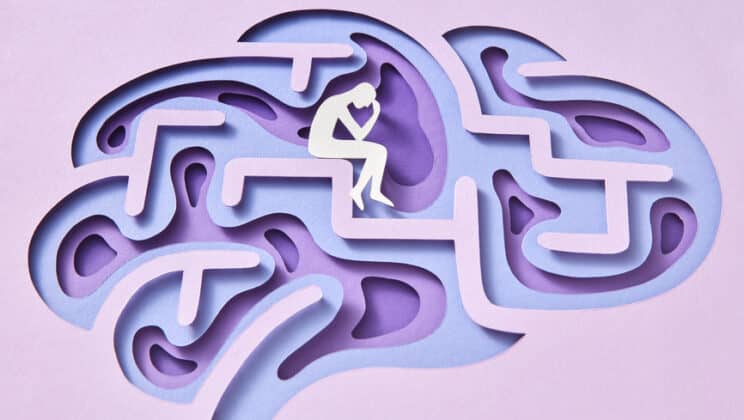7 Myths About Eating Disorders
February 26, 2024
Trigger warning: Contains references to binging, purging, restricting, over-exercising, and other eating disorder symptoms.
It can be challenging to separate fact from fiction when it comes to disordered eating because media portrayals, societal norms, and a general lack of understanding perpetuate myths about eating disorders. We’ll debunk some of these misconceptions about eating disorders so they don’t stop people from getting the help they need.
#1 People with eating disorders are underweight
Just because someone’s not dangerously thin doesn’t mean they don’t have an eating disorder. Eating disorders affect people across all body sizes. They’re defined by a range of symptoms—not just weight—including attaching self-worth to body weight or shape, having a distorted body image, and consistently trying to lose weight. This myth about eating disorders can be especially damaging for those who don’t look underweight because others may not understand the depth of their struggles, possibly leaving them with less support.
“This eating disorder myth often shows up with binge eating disorder. Maybe you live in a larger body, and feel like, ‘If I’m bigger, I can't have an eating disorder,’ or ‘Binge eating is just something people do,’” said Angela Celio Doyle, PhD, vice president of behavioral health at Equip, a renowned virtual eating disorder treatment program and trusted Lyra Health partner. “It’s important to recognize that eating disorders occur in all different body types.”
#2 Eating disorders are about appearance
Eating disorders aren’t a choice. They’re brain disorders rooted in factors like genetics, psychological issues, and environment that are beyond a person’s control. Concern about appearance is just one possible eating disorder symptom. People with eating disorders may initially like attention from weight loss, but eating disorders can become very secretive. For instance, people with anorexia often wear baggy clothes to hide their bodies and avoid attention.
“Eating disorders aren’t about vanity,” said Laura Sabin Cabanillas, MA, LPCC, CEDS, clinical director at the Eating Recovery Center, an international center for eating disorders and mood, anxiety, and trauma-related disorders, and a trusted Lyra partner. “Often eating disorders are self-protective for people who feel it’s the only thing they can control because they’ve lived out-of-control experiences through trauma, abuse, or strong messages that this is the only way they can be valued or loved.”
#3 Eating disorders aren’t serious
Eating disorders can have life-threatening complications, including cardiovascular issues, electrolyte imbalances, and organ damage. It’s essential to get support if you’re struggling. “Eating disorders have the second-highest mortality rate of any mental illness,” said Dr. Doyle. “They may co-occur with other conditions like anxiety, depression, and obsessive-compulsive disorder, which can increase their complexity and severity.”
A damaging myth about eating disorders is that your symptoms must be severe to need help. “People may underestimate the seriousness of an eating disorder,” said Dr. Doyle. “We hear this especially when we're talking about levels of care. People think if they’re ‘not sick enough’ for residential treatment, it’s not a significant problem. I encourage anyone who’s struggling to reach out. Even if you don’t need residential care, you could benefit from a wonderful experience working with a therapist to address these parts of your life—and everyone deserves help with those things.”
#4 People with eating disorders are young, white females
This myth about eating disorders ignores the reality that people of various ages, ethnicities, genders, and backgrounds face these challenges. No group is “protected” from eating disorders. Males, for example, account for at least one-quarter of anorexia and bulimia cases.
“The media typically paints a picture of individuals with eating disorders as young, white, affluent, heterosexual women, but a lot of research has shown eating disorders equally affect people of all different genders, ages, sexual orientations, races, and ethnic groups,” said Jenni Thome, PhD, a clinical quality supervisor at Lyra.
#5 Eating disorder recovery is just maintaining weight
A healthy weight is just one part of eating disorder recovery. It also involves addressing underlying psychological factors that contribute to the condition, building a positive relationship with food, and viewing overall well-being beyond physical measurements. It’s a mental and emotional shift, in addition to a physical one.
“Eating disorders shrink a person’s life, making it squarely focused on and organized around food, body weight, and body shape,” said Dr. Doyle. “In recovery, you see the world open up. You're able to enjoy time with friends and family. It brings out your true personality, and that’s beautiful.”
#6 If your body looks healthy, you’re healthy
What society deems a healthy-looking body doesn’t always tell the whole story, and this can perpetuate a common eating disorder misconception. People may have an eating disorder despite seeming like the picture of good health.
“We see higher incidences of eating disorders in athletes involved with lean weight and aesthetic-focused sports,” said Dr. Thome. “Athletes may be very focused on eating, exercise, and weight. In athletes who should be menstruating, not having your period isn’t necessarily a sign of being a great athlete. This could be indicative of relative energy deficiency where the athlete doesn’t have the energy intake necessary to support basic physical functions.’”
#7 People who eat healthy don’t have eating disorders
Sometimes “healthy eating” is a veiled rationalization for restricting eating behaviors. Relationships with food can be complex, and what looks like eating healthy can sometimes be a way to microfocus on food in an attempt to gain a sense of control when life feels unpredictable or stressful.
“There are people who cut out entire food groups or go overboard with ‘clean eating,’ and our culture has conditioned us to think that’s good and healthy,” said Cabanillas. “These are sometimes ‘eating disorders in disguise,’ also known as orthorexia—an obsession with eating healthy food. Dieting can be a strong gateway into eating disorders.”
You deserve help and healing
Eating disorders don’t always fit the societal mold we expect. Getting help is crucial, even if your experience doesn't align with widely held myths about eating disorders or conventional expectations. The sooner you get support, the sooner you can start living a life that’s healthier and more enjoyable.
“Full recovery from an eating disorder is possible,” said Dr. Doyle. “Some people think you always carry an eating disorder, but we see proof every day of life after an eating disorder.”
Begin your recovery journey
You can get started today if your organization has Lyra.
Author
The Lyra Team
The Lyra Team is made up of clinicians, writers, and experts who are passionate about mental health and workplace well-being. With backgrounds in clinical psychology, journalism, content strategy, and product marketing, we create research-backed content to help individuals and organizations improve workforce mental health.
Reviewer
Jenni Thome, PhD, LCP
Jenni Gerlach-Thome, PhD, LCP has over 20 years of experience in mental health care, specializing in areas such as eating disorders, crisis intervention, counseling, consultation, assessment, training, DEI initiatives, and program development. Currently, Dr. Thome provides clinical oversight and administrative supervision to licensed providers at Lyra, while also providing individual therapy to clients.
Explore additional blogs

Mental health conditions
Eating Disorder Symptoms: Do I Need Treatment?

Mental health conditions
Recognizing the Signs of Suicide at Work

Mental health conditions